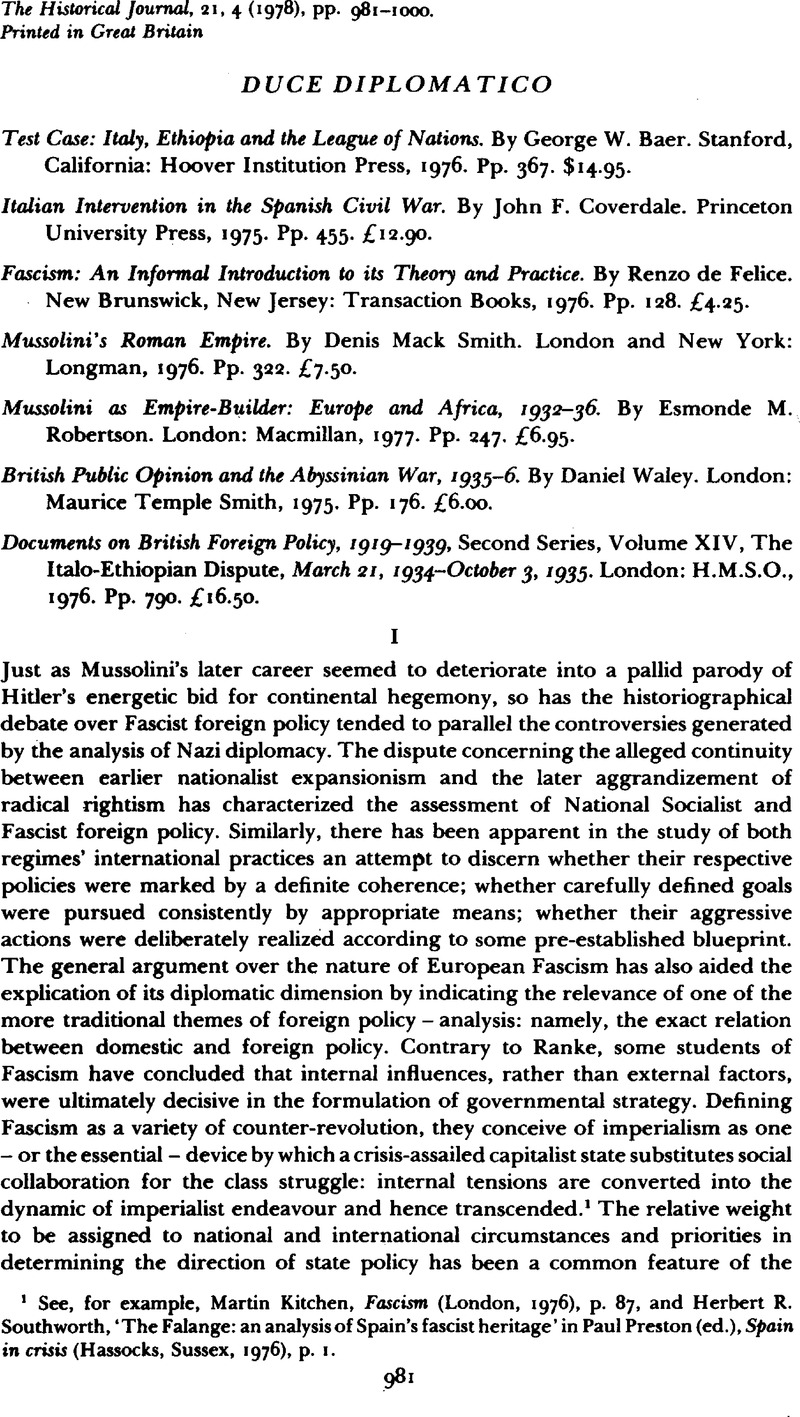Article contents
Duce Diplomatico
Published online by Cambridge University Press: 11 February 2009
Abstract

- Type
- Review Articles
- Information
- Copyright
- Copyright © Cambridge University Press 1978
References
1 See, for example, Kitchen, Martin, Fascism (London, 1976), p. 87CrossRefGoogle Scholar, and Southworth, Herbert R., ‘The Falange: an analysis of Spain's fascist heritage’ in Preston, Paul (ed.), Spain in crisis (Hassocks, Sussex, 1976), p. 1.Google Scholar
2 Carocci, G., Italian Fascism (Harmondsworth, Middlesex, 1974), p. 92.Google Scholar
3 Hillgruber, Andreas, Hitlers Strategie, Politik und Kriegführung, 1940–1941 (Frankfurt am Main, 1965), p. 128.Google Scholar
4 van Creveld, Martin, Hitler's strategy, 1940–1941: the Balkan clue (London, 1973), pp. 9, 12 and 22.Google Scholar This is not necessarily to imply that Hitler was ignorant of, or strongly averse to, such an Italian invasion of Greece, Van Creveld has argued that Hitler, notwithstanding the traditional view that he was taken by surprise by the Italian incursion into Greece, was well aware of their aggressive project and had sanctioned it – at least negatively by refusing to veto it in advance (ibid. pp. 5, 9–13, 18–19, 30–51). Additional evidence for van Creveld's assertion of prior German knowledge and toleration of the Italians' Greek expedition is contained in Hill, Leonidas E. (ed.), Die Weizsäcker-papiere, 1933–1950 (Frankfurt am Main, 1974), p. 221.Google Scholar
5 Muggeridge, Malcolm (ed.), Ciano's diary, 1939–1943 (London, 1947), p. 99.Google Scholar
6 Denis Mack Smith did argue in a previous book that Mussolini had so frequently preached war and conquest that he had to seek out a weak victim – Ethiopia – in order to put his gospel into practice (Smith, D. Mack, Italy, a modern history, Ann Arbor, 1969, p. 448).Google Scholar
7 Ibid. pp. 447, 455, 457, 466–73.
8 Ibid. p. 446.
9 Aloisi, Pompeo, Journal, 25 juillet 1932–14 juin 1936, translated by Vaussard, M. (Paris, 1957).Google Scholar
10 Baer, G. W., The coming of the Italian–Ethiopian war (Cambridge, Mass., 1967).CrossRefGoogle Scholar
11 Ibid. p. 233.
12 Ibid. pp. 58–61.
13 Documents on British foreign policy (D.B.F.P.), 1919–1939, ser. 2, xiv, pp. 281–2.
14 Ibid. p. 273.
15 Parker, R. A. C., ‘Great Britain, France and the Ethiopian crisis, 1935–1936’, English Historical Review, LXXXIX (1974), p. 301.CrossRefGoogle Scholar
16 D.B.F.P., ser. 2, XIV, 435.
17 Baer, , Coming of the Italian–Ethiopian war, p. 256.Google Scholar
18 Muggeridge, (ed.), Ciano's diary, p. 52.Google Scholar
19 Bernardini, Gene, ‘The origins and development of racial anti-semitism in Fascist Italy’, Journal of Modern History, XLIX, 3 (1977), p. 432.Google Scholar
20 Ibid. p. 442.
21 Ibid. pp. 436–44, 449–53.
22 Baer, , Coming of the Italian–Ethiopian war, pp. 191–2.Google Scholar
23 D.B.F.P., ser. 2, XIV, x, 208, 215–16.
24 Ibid. p. 226.
25 Earl of Avon, The Eden memoirs: facing the dictators (London, 1962), p. 180.
26 D.B.F.P., ser. 2, XIV, 344–5. Eden carefully omitted any mention of Laval's admission about this point in the detailed account of his talks with the French premier contained in his memoirs (Memoirs, pp. 232–4).
27 Warner, Geoffrey, Pierre Laval and the eclipse of France (London, 1968), p. 69.Google Scholar
28 Ibid. pp. 67–9: Watt, D. C., ‘The secret Laval–Mussolini agreement of 1935 on Ethiopia’, in Robertson, Esmonde M. (ed.). The origins of the Second World War (London, 1971). pp. 930–3.Google Scholar
29 Baer, , Coming of the Italian–Ethiopian war, pp. 82–3.Google Scholar
30 Watt, , ‘Secret Laval–Mussolini agreement’, p. 233.Google Scholar
31 Parker, , ‘Britain, France and the Ethiopian crisis’, pp. 298–300, 306–7.Google Scholar
32 Quartararo, Rosario, ‘Imperial defence in the Mediterranean on the eve of the Ethiopian crisis (July–October 1935)’, Historical Journal, xx, 1 (1977), 200–1.Google Scholar
33 Baer, (Test case, pp. 96–7)Google Scholar supports the view held by Marder, Arthur J. (From the Dardanelles to Oran: studies of the Royal Navy in war and peace, 1915–1940 (London, 1974), pp. 82–5)Google Scholar that the British naval chiefs did not fear war with Italy because they lacked confidence in their ability to win it. Rather were they worried that the naval damage sustained in such Mediterranean hostilities would impair their capacity to meet the Japanese threat in the Far East or a sudden German challenge. Quartararo, again, has noted, however, that the British chiefs of staff's confidence in victory over Italy was badly shaken by October–November 1935, when they realized the scale of the Italian menace – with submarines in the Red Sea and even off Gibraltar, and heavily fortified bases on the Dodecanese Islands – and the extent of their own weakness. They could only take refuge in an assumed lack of martial virtues amongst the Italians (‘Imperial defence in the Mediterranean’, pp. 190–1, 202–20).
34 Parker, , ‘Britain, France and the Ethiopian crisis’, pp. 313–20.Google Scholar
35 Ibid. pp. 331–2.
36 Barcelona, , revised edition, 1977.Google Scholar
37 Ibid. p. 306.
38 Ibid. pp. 306, 310.
39 Ibid. pp. 304–5.
40 Ibid.
41 Suñer, R. Serrano, Memorias: entre el silencio y la propaganda, la historia como fue (Barcelona, 1977), pp. 301–5, 322, 331–48.Google Scholar
42 Documents on German foreign policy, 1918–1945, series D, Vol. XI. The war years, September 1, 1940–January 31, 1941 (London, 1961), 121, 214, 256, 333.
43 Hill (ed.), Die Weizsäcker-papiere, p. 221.
44 Van Creveld, , Hitler's strategy, p. 46.Google Scholar
- 2
- Cited by




